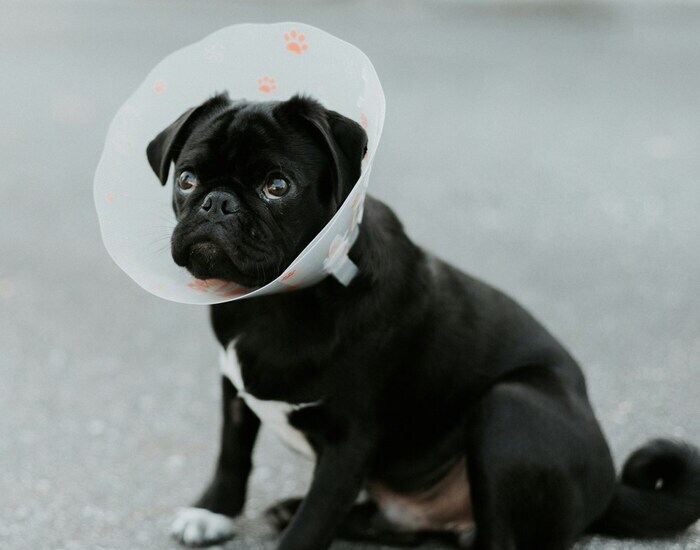Pet Spay & Neuter
BOOK APPOINTMENTPet Spay & Neuter in Elon, NC
At Elon Oaks Veterinary Hospital in Elon, NC, we offer Spay & Neuter surgeries for dogs and cats. Our experienced team uses safe, effective procedures and you can trust us for compassionate, professional care throughout the process.
Why Choose Elon Oaks Veterinary Hospital for Your Pet’s Spay/Neuter?

We know that you have many options for veterinarians to trust with your pet’s spay or neuter surgery. At Elon Oaks Veterinary Hospital, we have made several intentional choices to ensure that your pet’s procedure is as safe as possible, and these components are included in all spay packages and in canine neuter packages at no additional charge. Given everything we include, our spay and neuter packages are the most cost effective in the area!
- Pre-anesthetic bloodwork is included in all spay packages and canine neuter packages. This enables us to ensure that your pet is healthy enough to have anesthesia and surgery.
- IV catheter and IV fluid therapy are included. In the case of an emergency, moments count, and having IV access is essential to make anesthesia as safe as possible.
- Capnography measures the amount of carbon dioxide a patient is exhaling, which provides critical information about how well the patient is breathing. We use capnography on our spays and neuters (as well as other surgeries) to enable us to minimize the risk of anesthetic complications. It requires additional equipment, so some veterinary hospitals do not measure this important value.
- Pain control included – Both an injection on the day of the procedure and medication to go home, so your pet has a smooth and comfortable recovery.
- Microchip included with every spay or neuter
Why Spay/Neuter Your Pet?
Our hospital recommends that most cats and dogs be spayed (female pets) or neutered (male pets), unless there are plans to breed them as part of a responsible breeding program. Spay and neuter surgeries remove reproductive organs from your pet, eliminating their ability to produce offspring. These procedures can help control the pet population, and may also reduce the risk of some health issues and unwanted behaviors.
Here are some key considerations when deciding to spay or neuter your pets:
- Prevent Certain Diseases: Spaying female pets can reduce the risk of uterine, ovarian, and mammary cancers, as well as reproductive diseases such as pyometra, which is a life-threatening uterine infection. Neutering male pets can prevent testicular cancer and lower the risk of some prostate problems.
- Reduce Overpopulation: Spaying and neutering help control the pet population, reducing the number of homeless animals and the burden on animal shelters. The ASPCA states that approximately 3.3 million dogs and 3.2 million cats enter U.S. animal shelters every year.
- Decrease Reproduction-Related Behaviors: Intact female dogs come into “heat” every 4-12 months (usually every 6-8 months for most breeds). During this period, they can be expected to drip bloody fluid for 1-3 weeks. They may experience behavior changes, such as becoming more clingy or more irritable. Male intact dogs may whine or bark excessively when an intact female dog is in heat and may destroy barriers in their efforts to reach her. Female intact cats cycle in and out of heat every few weeks during the spring and summer. They exhibit signs such as persistent yowling and restlessness. Male intact cats are more likely to mark their territory with urine and to exhibit aggressive tendencies. Having your pet spayed or neutered decreases these reproduction-related behaviors.*
*A note about behavior and spay/neuter: Many pet owners hope that having a pet spayed or neutered will improve problem behaviors such as aggression, urine marking, humping, or excessive energy. Unfortunately, the relationship between reproductive hormones and behavior is complicated. Although the loss of reproductive hormones may alter some behaviors, it is rare that spay or neuter alone will correct behavioral issues. If you are struggling with a problem behavior with your pet, we recommend scheduling an appointment to discuss these issues with our veterinarians.
How to prepare your pet for spay/neuter?
Preparing your pet for spay/neuter surgery involves several steps to ensure their safety and comfort before and after the procedure. Here’s what you need to know:

Pre-Surgery Process
- Consultation with Veterinarian: Schedule a pre-surgery consultation with our veterinarians to discuss the procedure, address any concerns, and receive specific instructions. They will perform a pre-surgery health check to ensure your pet is fit for anesthesia and surgery.
- Fasting Instructions: Your pet should not eat anything after midnight the night before surgery to prevent vomiting during anesthesia. They may continue to have access to water up to the morning of surgery.
- Update Vaccinations: Ensure your pet is up-to-date on vaccinations before surgery to minimize the risk of infections. We require dogs to be up-to-date on their DAPP, Bord, and Rabies vaccinations and for cats to be up-to-date on FVRCP and Rabies vaccinations prior to surgery.
Post-Surgery Care
- Rest and Recovery: After surgery, your pet will need a quiet, comfortable space to rest and recover. Limit activity and provide soft bedding.
- Monitor Incision: Keep an eye on the incision site for any signs of infection, excessive swelling, or discharge. Contact your veterinarian if you notice any abnormalities.
- Pain Management: Our veterinarians will prescribe pain medication to keep your pet comfortable during the recovery period. Administer as directed.
- Follow-Up Appointment: Schedule a follow-up appointment with veterinarian to ensure proper healing and remove any sutures, if necessary.

Frequently Asked Questions
Can My Pet Eat Before Surgery?
When Can My Pet Resume Normal Activities?
How Long Does It Take for Pets to Recover?
Is There a Specific Age to Spay/Neuter a Pet?
The ideal age for spaying or neutering a pet varies depending on factors such as species, breed, size, and family preference. Many families elect to spay or neuter their pet at a young age, typically before they reach sexual maturity. Some families choose to delay the time of spaying or neutering until after their pet reaches physical and sexual maturity. At Elon Oaks Veterinary Hospital, our veterinarians make customized recommendations for each patient, taking into consideration the pet’s breed, lifestyle, and the family’s preferences. Schedule an appointment today to discuss your pet’s individual recommendation!
Here are some general guidelines:
- Managing an intact (aka not spayed or neutered) dog or cat is a big responsibility and can be inconvenient. If a family prefers not to take on this task, we support spaying or neutering dogs as early as 6 to 9 months old and spaying or neutering cats as early as 4 to 6 months old.
- There is some limited data that suggests it may be advantageous to delay the time of spaying or neutering for some pets until after they reach physical and sexual maturity. If a family is interested to know if this applies to their pet, we encourage them to discuss with our veterinarians during their pet’s appointment.
If you have any further questions or would like to schedule a spay/neuter surgery for your pet, please don’t hesitate to contact us at Elon Oaks Veterinary Hospital. Our team is here to provide compassionate care and answer any inquiries you may have.
